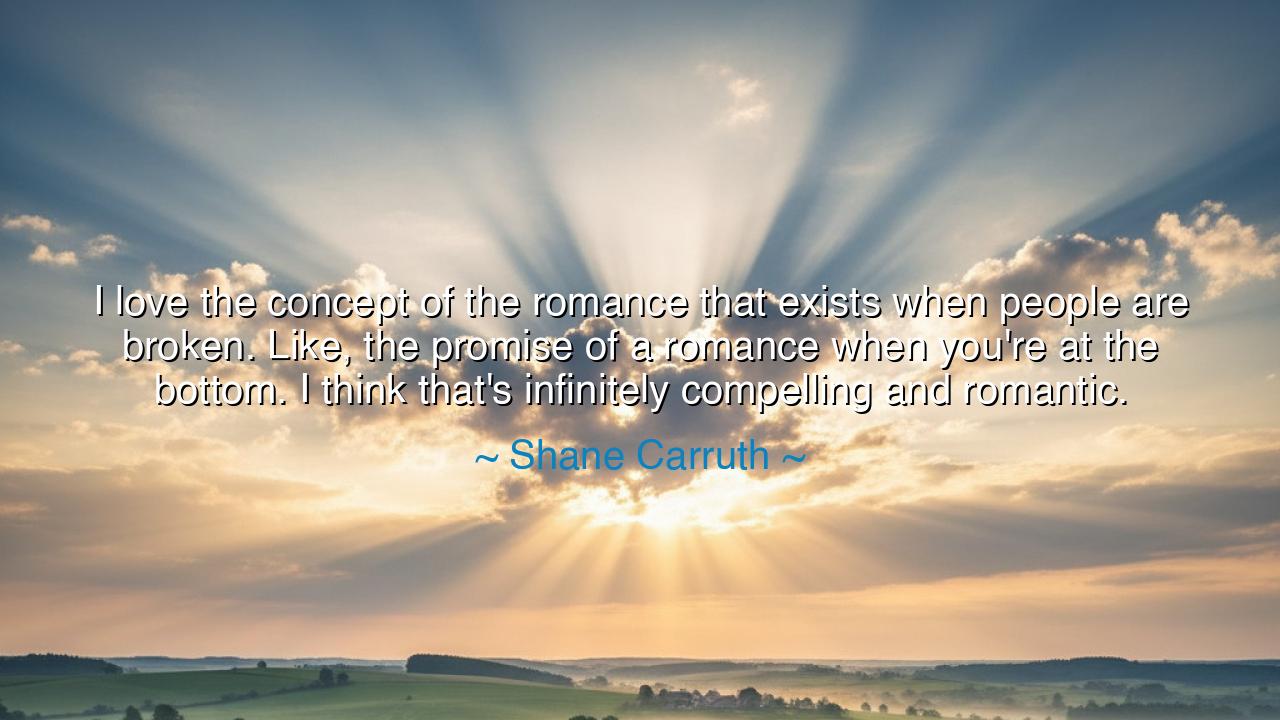
I love the concept of the romance that exists when people are
I love the concept of the romance that exists when people are broken. Like, the promise of a romance when you're at the bottom. I think that's infinitely compelling and romantic.






"I love the concept of the romance that exists when people are broken," Shane Carruth declares, and in these words, he captures a truth both tender and powerful. There is something deeply compelling in the notion of romance rising from the depths of despair, of finding connection in the moments when we are most vulnerable, most shattered. Romance, in this sense, is not merely a lighthearted affair, nor is it the pursuit of perfection. Instead, it is the coming together of two souls in the face of adversity, brokenness, and loss—a connection that is forged not in the fullness of joy but in the shared understanding of suffering. To experience such a romance is to witness the resilience of the human spirit, the ability to rise from the ashes of despair and find beauty amidst the ruin.
This idea of romantic connection in the face of brokenness has ancient roots. Consider the myth of Orpheus and Eurydice. Orpheus, a great poet and musician, descended into the Underworld to retrieve his wife, Eurydice, who had died tragically. His love for her was so deep, so intense, that it transcended the boundaries of life and death itself. This romance was not born of ease or carefree moments—it was a romance born from the very depths of grief, from a desire to restore what had been lost. In his journey through the underworld, Orpheus faced trials and ultimately lost his love once again. But in the struggle, in the brokenness of his heart, there was a profound beauty—the enduring power of love amidst unimaginable pain. It is this very essence of romance, this connection forged in adversity, that Carruth finds infinitely compelling.
The concept of romantic love in the face of hardship can be seen throughout history, not as a fleeting whim but as a deep, transformative force. Consider the story of Antony and Cleopatra, whose romance defied both personal and political boundaries. At the height of their love, they were surrounded by treachery and betrayal. Their romance was not just a grand, passionate affair; it was a rebellion against the forces that sought to destroy them. As Antony faced defeat in battle and Cleopatra struggled to maintain her kingdom’s independence, their love became a symbol of resistance, of defying the odds even when all seemed lost. Their love story is one that transcends the glamour of royalty and speaks to the shared vulnerability that they faced in their final days.
Carruth's admiration for this type of romance—born from brokenness—reveals a profound truth: that it is often in our darkest hours that we find the greatest capacity for connection. Human beings, in their most fragile moments, are perhaps most open to the love of another. It is when we are torn apart, when we are vulnerable and exposed, that we seek solace in others who can understand the depths of our pain. This type of connection is not based on superficial attraction, but on a shared understanding of what it means to be whole only through the fragments of one another. It is a connection forged not in perfection, but in the recognition of imperfection.
The beauty of such a romance is that it is not bound by circumstances, by wealth, or by social standing. The most profound loves are not those that arise in times of ease but those that emerge from the crucible of hardship. Courage is found in these moments, as each partner offers not only their love but their own brokenness, their own scars, in the hope that together they may heal. Think of the countless stories from literature and history, where love has served as a balm for the soul in the face of destruction. From Victor Hugo’s Les Misérables to the tragic love of Abelard and Heloise, we see that true romantic connection often arises when life is at its most unforgiving.
The lesson here is that romance, as Carruth understands it, is not something to be found in perfect circumstances. True romance is not found in fantasy, nor in fleeting moments of happiness, but in the moments when we are most vulnerable, when we are most broken. It is in these moments that love has the power to heal, to transcend pain, and to bind us to one another in ways that cannot be undone. To love in the face of brokenness is to engage in the most authentic form of connection—a bond that is not based on illusion, but on the raw truth of being human.
In your own life, take this lesson to heart: embrace your vulnerabilities, for they are the doorway to the deepest connections you can form. When you face hardship, do not retreat into isolation, but seek the connections that are formed in the fires of struggle. Love with courage, not because everything is perfect, but because you are both willing to share the pieces of your soul that have been shaped by adversity. Only then will you experience the truly transformative power of romance—the kind that has the power to heal, to uplift, and to last, even when everything around you seems to crumble.






AAdministratorAdministrator
Welcome, honored guests. Please leave a comment, we will respond soon